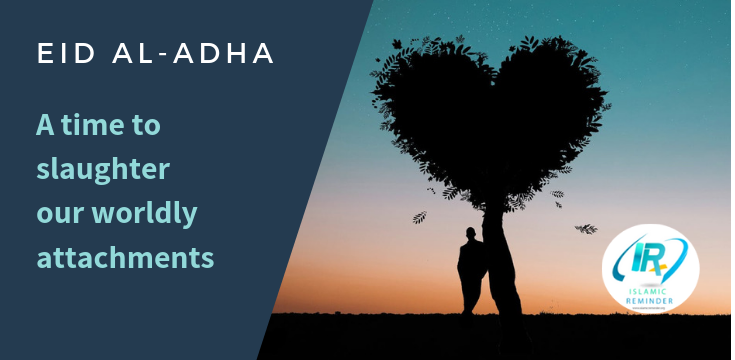Eid Al-Adha, the “Festival of Sacrifice”, is one of the two day of celebrations in Islam. It marks the culmination of Hajj in the holy month of Dhul-Hijjah at the time of Qurbani (sacrifice) and is celebrated on the tenth of the month.
Eid Al-Adha honors the devotion of Prophet Ibrahim (AS) to Allah Almighty and his preparedness to sacrifice his son, Ismail as per Allah’s command. But, before Ibrahim (AS) could sacrifice his son, Allah sent a ram from heaven which was to be slaughtered instead. So, in commemoration of this intervention, Muslims all over the world celebrate this day by sacrificing an animal, also known as Udhiya.
Traditionally, the day is spent rejoicing with family and friends, wearing one’s best attire, preparing appetizing dishes and distributing gifts among loved ones.
But is Eid Al-Adha all about having fun, eating tasty foods and feasting all day?? No, we must remember and mull over the story of Ibrahim (AS) when he was asked to sacrifice his most prized possession and how he was prepared to submit at once. Ask yourself, what will you do if your best friend asks you for your most treasured belonging? Would you give it away without a moment’s hesitation or think of excuses you could make? This question may be a difficult one for you as none of us can easily make such a great sacrifice.
When Ibrahim had the dream that Allah told him to sacrifice, the next day he sacrificed one hundred goats. He had the same dream during the second night, so he sacrificed one hundred camels the second day. However, the dream came back to him on third night. This time Ibrahim said “O Lord! I have been sacrificing for two days”. He then understood that he had to sacrifice what he loved the most in the world: his son, Ismail. Allah narrates the story in the Quran as follows:
“When the boy was old enough to work with his father, Ibrahim said my son, I have seen myself sacrificing you in a dream. What do you think? He said, father do as you are commanded and, God willing, you will find me steadfast. When they had both submitted to God, and he had laid his son down on the side of his face, we called out to him Ibrahim you have fulfilled the dream. This is how we reward those who do good. It was a test to prove their true characters, we ransomed his son with a momentous sacrifice and we let him be praised by succeeding generations, peace be upon Ibrahim! This is how we reward those who do good: truly he was one of our faithful servants”. (Quran 37: 99-112)
This sacrifice was a great test for Ibrahim (AS), which he passed with flying colors, as he and his son both were prepared to submit to Allah, without asking even a single question. We must ask ourselves, can we do the same? Can we sacrifice our most valued possession in the way of Allah? The answer indicates the status of our imaan.
There is also a great lesson of patience and perseverance in the story of Ibrahim (AS). He remained calm and composed in times of difficulty. And as a result of his unwavering imaan, Allah “let him be praised by succeeding generations”. This world is not a place of enjoyment, it is a place of trial and testing. Allah says in the Quran:
“And indeed we will try you with fear, hunger, damage to your wealth and lives and give glad tidings to the patient”. (Quran 2:155)
Eid Al-Adha is a time to re-evaluate and re-ignite our imaan and love for Allah, our Lord and Creator. He loves us more than seventy mothers, but can we reciprocate that love too? Are we prepared to slaughter our worldly attachments like Ibrahim (AS) was prepared to slaughter his?
“Many years ago, our father Ibrahim (AS) made a choice. He loved his son. But he loved God more. The commandment came to sacrifice his son. But it wasn’t his son that was slaughtered. It was his attachment. It was his attachment to anything that could compete with his love for God. And the beauty of such a sacrifice is this: Once you let go of your attachment, what you love is given back to you – now in a purer, better form. So let us ask ourselves in these beautiful days of sacrifice, which attachments do we need to slaughter?” (Yasmin Mogahed)




